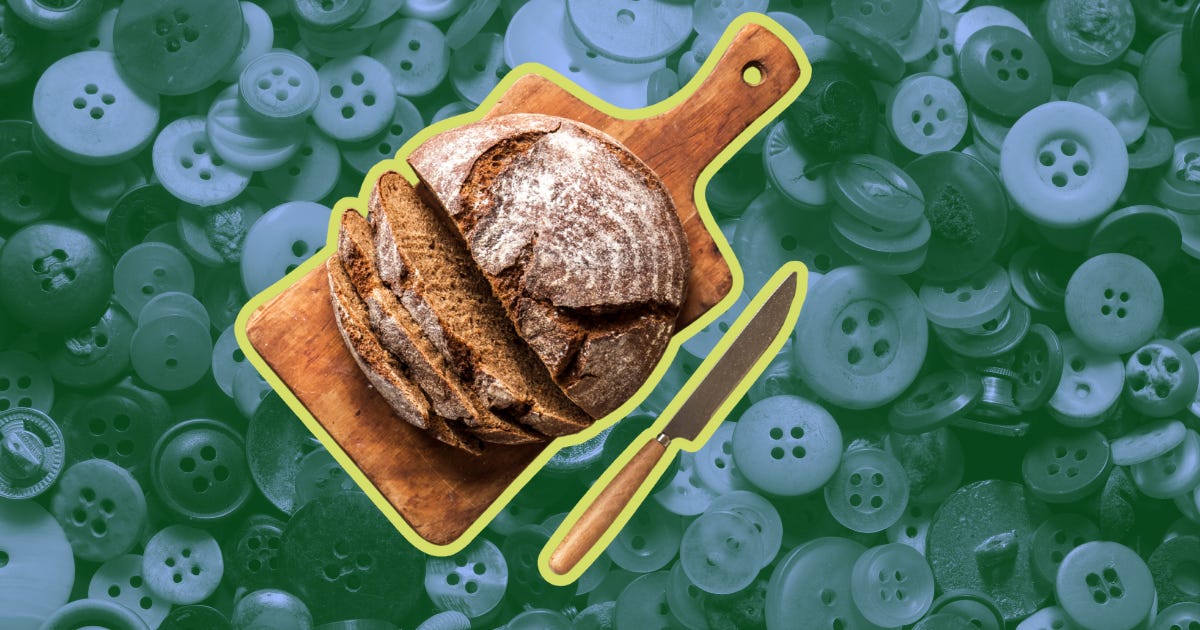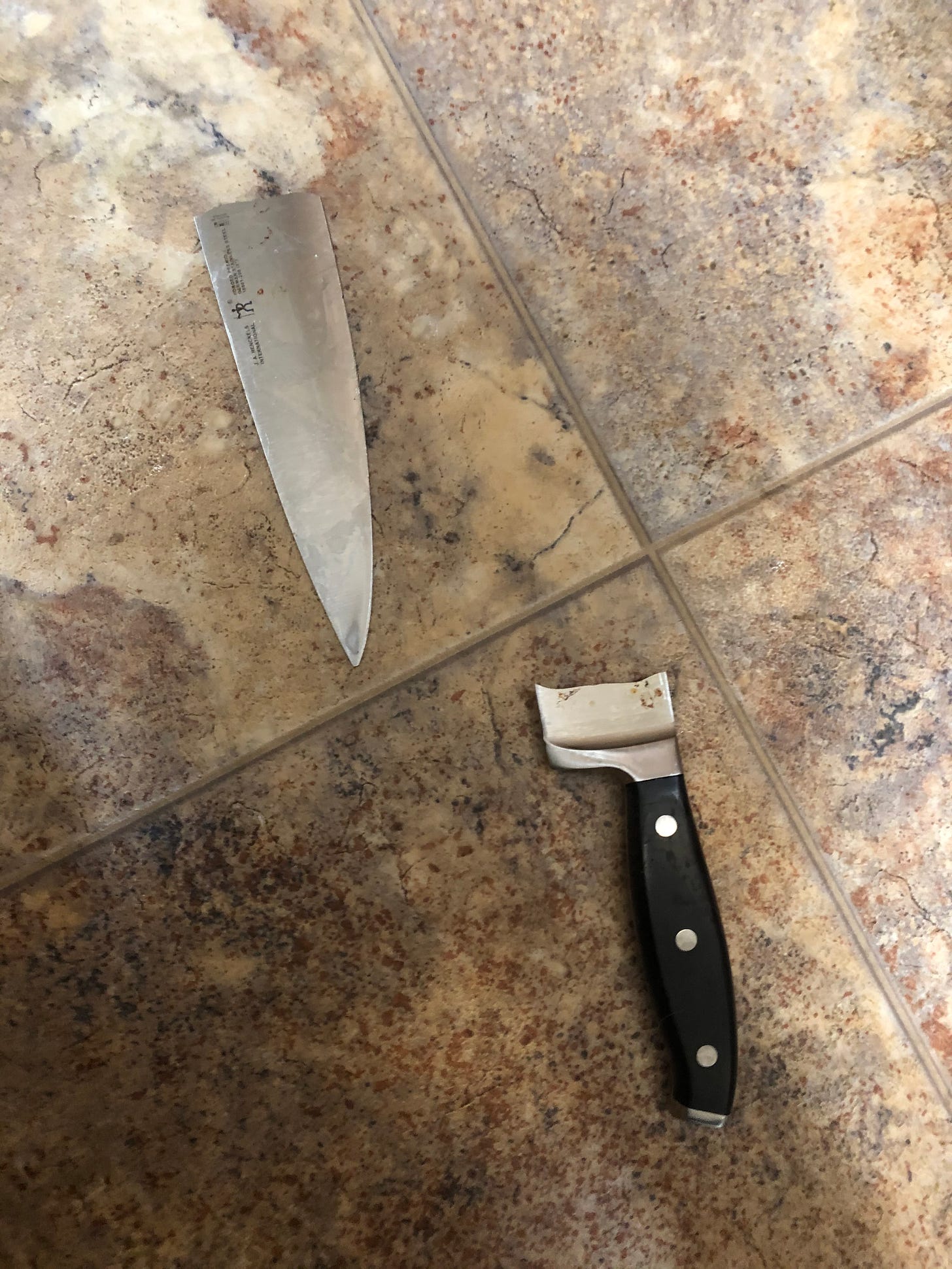When did basic life skills become “trad”?
We’ve outsourced so many basic life skills that sewing on a button feels like a political statement.
Over the last few weeks, several people have called me “trad.” This was neither in response to my religious sensibilities nor my political ones (which, admittedly, both of those things are only partially in line with the “trad” crowd), but in the context of a conversation similar to this:
Me: “What did you do over the weekend?”
Them: “Oh nothing much. I slept in. What about you?”
Me: “I tried baking a sourdough loaf for the first time. It turned out well!”
Them: “Wow! You’re so trad!”
I’m always taken aback by this response. I always related bread baking to a hobby for shut-ins and introverts — not people who wear prairie dresses, homeschool their children, and post to Instagram about how to be a good wife. But even when I have this conversation where I replace “sourdough bread” with “worked on a sewing project,” “roasted a chicken,” “fixed the hem on my pants,” “organized my pantry,” or, on at least one occasion, “cleaned my kitchen,” I have been met with shock and awe that I am so domestic and feminine.
While I wish I could accept the praise of being such a gleaming example of a domestic goddess, I am actually a C-minus housekeeper1, B-plus seamstress and an A-minus, if infrequent, cook. The walkways in my home are clear of debris, and almost everything is put away, but I gave up on my building’s dust situation years ago, and my bed sheets are probably two weeks overdue for a change. I took up sewing as a hobby in high school and enjoy wearing the clothing I made, but my projects are rarely complicated. I eat out more than I should, but almost everyone I have set a plate of food in front of has eaten the whole thing and asked for seconds — even when I, the cook, forget about the leftovers in the fridge for weeks on end.
Perhaps I spend too much time in my own world, but all of this seems normal. I wouldn’t expect everyone to know how to sew, knit or make a spectacular cake from scratch, but I’ve been surprised with the number of friends and acquaintances who don’t even know how to sew a button onto a shirt, how to fry an egg without burning it, that the extra hot spin cycle will ruin anything with lycra or spandex, or that garbage bags aren’t recyclable. I’m bewildered at the people I have seen with a look of terror on their faces when they are handed a baby. I’m even more perplexed as to why people find these things as gendered as they do, when knowing how to turn on a gas stove or thread a needle should be a universal skill.
The word “trad” is now becoming a stand-in for what I would consider basic life skills and hobbies. Despite the fact that they were once commonplace and expected of most adults, the concept of being able to roast a chicken2 or grow a windowsill herb garden is not only foreign, but glorified as something that only aesthetic, trad-wife influencers or religious fundamentalists do on Instagram.
In college, I lived in a house with three other girls, two of them sisters, shared one small bedroom, yet tore through the house like a hurricane. While I cannot claim to ever have been the cleanest roommate — as several former roommates can attest — I had nothing on these two. There was a constant, inexplicable film on the kitchen floor. Their bathroom always had the faint stench of sewage. When they moved, the white carpet that went from the first floor to our bedrooms on the second had a distinct path of dirt that led directly into their bedroom and left a well-defined line around where all their furniture once stood.
In a fit of frustration, I once put a large, passive-aggressive note on the fridge telling “everyone” in the house that if we didn’t keep the kitchen clean, we would get rats. A few days later, I came home to see that my note had been torn down and replaced with another note:
Hey, everyone! We really need to keep the kitchen clean because I found a rat today. Thx!
One of the sisters, who kept her cereal boxes wide open on the bottom pantry shelf, had poured herself a bowl of Coco Puffs along with the rat that had crawled in there and died. Despite the constant fights I had with my parents about how to put food away properly as a child, I am immensely grateful that they taught me the basic skill of rolling the plastic sleeve in my cereal down, closing the tab, or just putting it in another container altogether.
But why is it that people don’t know these skills to begin with, and moreover, why do people think they are “trad”? The answer may lie in why we prize them as such a novelty — the need for them is almost unnecessary, but they remind us of watching our mom cook when we were five. We’ve automated much of our daily labor, which is probably for the best. As Betty Friedan observed, modern appliances liberated women from the drudgery of handwashing every dish. The modern American supermarket liberated us from having to farm our own food. The freezer liberated us from having to cook that food. Shein liberated us from having to fix a broken button on our shirts when buying a new one is so much cheaper and efficient.
These modern-day conveniences have been a miracle, and certain pieces of knowledge are no longer necessary to live a productive life. We no longer have to do back-breaking labor just to have clean clothing. Dinner can be done in 15 minutes or less. You can throw your clothing away if the seam rips. But despite all the time and energy it saves, we fill the hours by being hyper productive at work and are too exhausted to take out the trash when we get home.
What’s left are the people who do these things as a hobby, i.e., the Ballerina Farms of the world. She was someone who had the time and money to get good at learning to make cheese from scratch and the business acumen to turn it into a highly visible business. And then we watch, or hate-watch, every single one of her videos because we are charmed by this digital Petit Trianon and how it makes us feel. We feel a tension between the independence that modern conveniences promised and the satisfaction we feel when we pull a cake out of the oven — and it didn’t collapse. And when you don’t know how to do ANY of the aforementioned things, that tension is even stronger.
When I was maybe 14 years old, I went to a mid-week church activity. This week, they separated the boys from the girls, and had the boys go to the church basketball court and lift weights while the girls *drumroll, please* learned how to do laundry.
The injustice of it all.
The NERVE.
DIDN’T THEY KNOW WOMEN CAN DO ANYTHING?!
I couldn’t believe they were making us do something so gendered.
Yet, for me, that was one of the most memorable lessons from this particular strain of church activities. I still remember what the little symbols on the tags meant, how to separate colors and lights, and that, when in doubt, to use cold water. That is not to say that we also couldn’t have benefited from lifting weights or that the young men didn’t need to learn to do laundry — we absolutely should have had those opportunities — but there was value in learning to do a remarkably “trad” activity.
If I could go back in time and tell that girl who was murmuring on the sidelines, “Why do I even know how to do this?” or, for that matter, anyone else who has rolled their eyes at the idea of making a pie from scratch when Marie Calendar’s already has a great frozen one I would say the following:
These aren’t skills to be a good housewife, they are things everyone should know because they will make your life better. Men, are you reading this? I’m talking to you, too.
You don’t have to know how to churn butter or milk a cow, but love really is a tastable ingredient, and your macaroni and cheese will taste better when you make it from ingredients you find at the store instead of out of a box.
One day, you will have a friend who is sad, a neighbor who is sick, or a family that is on the verge of a complete meltdown. Even if your idea of dinner 95% of the week is a frozen pot roast from Costco (which is amazing, by the way), knowing how to make ONE thing from scratch even if it’s the Nestlé chocolate chip cookie recipe printed on the bag or a strawberry rhubarb pie where the biggest accomplishment is actually using rhubarb — not Swiss chard — will deescalate the situation and help people feel like they matter.
You might be dating someone, and even if the only thing you know how to make is chicken, rice, and a salad, she’ll be impressed (and perhaps grateful to know she is not dating a child).
You’ll be saved the grief of breaking your favorite chef’s knife because you didn’t realize that you were supposed to hand-wash it, dry it, and immediately return it to the block3.
It may seem small, but your child will remember that you took a needle and thread and fixed their favorite stuffed animal, even if the stitches are uneven and they never thank you for it. Your spouse will feel special when you go out of your way to get a stain out of their favorite shirt.
You will feel pride and meaning in the fruits of your labors, even if said fruits are a scarf that is missing a few stitches here and there.
You will better appreciate what you have and probably stop buying stuff you don’t need.
You might even find that you get really good at a hobby and love getting the opportunity to brag about it on Instagram.
Unless, of course, you are my parents reading this, in which case my house is as spotless as a hospital surgical suite.
Hot tip: Leave it out until it’s room temperature. It took me years to learn this, and I have subsequently eaten a lot of raw chicken.
To be fair, I still don’t do this, even though I know I should.





Great job! I know adult women who still ask their mothers to fix a ripped seam.